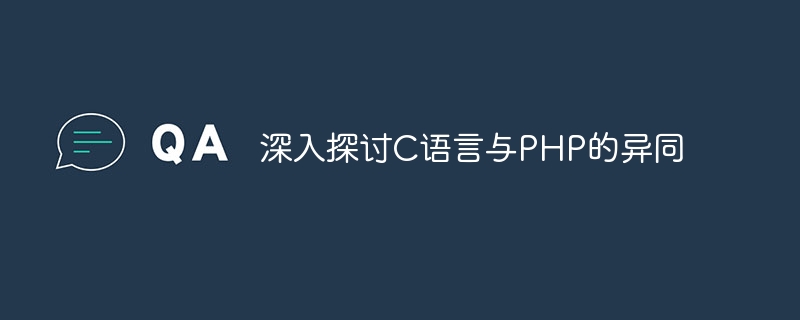

C language and PHP are two different types of programming languages, representing compiled languages and interpreted languages respectively. Although they are very different in syntax and usage, there are some similarities in some aspects. This article will delve into the similarities and differences between C language and PHP, and demonstrate the differences and connections between them through specific code examples.
First, let’s start the comparison with a simple “Hello World” program. In C language, a simple "Hello World" program looks like this:
#include <stdio.h>
int main() {
printf("Hello, World!
");
return 0;
}In PHP, the corresponding program is as follows:
<?php echo "Hello, World!"; ?>
As can be seen from the above example, C language needs to use the main function as the entry point of the program, while PHP achieves this by writing code directly. In addition, the semicolon is used in C language to indicate the end of a statement, while the semicolon in PHP also indicates the end of a statement.
There are also some differences between C language and PHP in the declaration and use of variables. In C language, you need to declare the type of a variable first and then assign it. For example:
int num = 10;
In PHP, you can directly assign values to variables without specifying the variable type. For example:
$num = 10;
In addition, there are some differences between C language and PHP in the definition and calling of functions. In C language, the definition of a function is usually placed after the main function, but in PHP, the definition of a function can be anywhere without affecting the call of the function.
In addition, the processing of arrays is also an important difference between the two. In C language, array subscripts start from 0, while in PHP, array subscripts start from 1. For example, in C language:
int arr[5] = {1, 2, 3, 4, 5};
printf("%d", arr[0]); // Output 1in PHP:
$arr = array(1, 2, 3, 4, 5); echo $arr[1]; // Output 2
For loop structures, although both C language and PHP support loop structures such as for and while, they are different in syntax. For example, in C language:
for (int i = 0; i < 5; i ) {
printf("%d
", i);
}In PHP:
for ($i = 0; $i < 5; $i ) {
echo $i . "
";
}In addition, C language and PHP support pointer and array operations respectively. In C language, the address of a variable can be accessed and modified through a pointer. In PHP, array is a powerful data structure that can be easily manipulated.
In general, C language is more suitable for writing low-level system-level code, has high performance and flexibility, and is suitable for fine control of memory and hardware. PHP is more suitable for website development because it has rich built-in functions and is easy to learn and use.
It can be seen from the above comparison that there are many differences and similarities between C language and PHP in terms of syntax and usage. Developers should choose an appropriate programming language for development based on actual needs to improve efficiency and performance.
Through the above specific code examples, we have a more in-depth discussion of the similarities and differences between C language and PHP. We hope that readers can get some inspiration and help from them.
The above is the detailed content of In-depth discussion of the similarities and differences between C language and PHP. For more information, please follow other related articles on the PHP Chinese website!